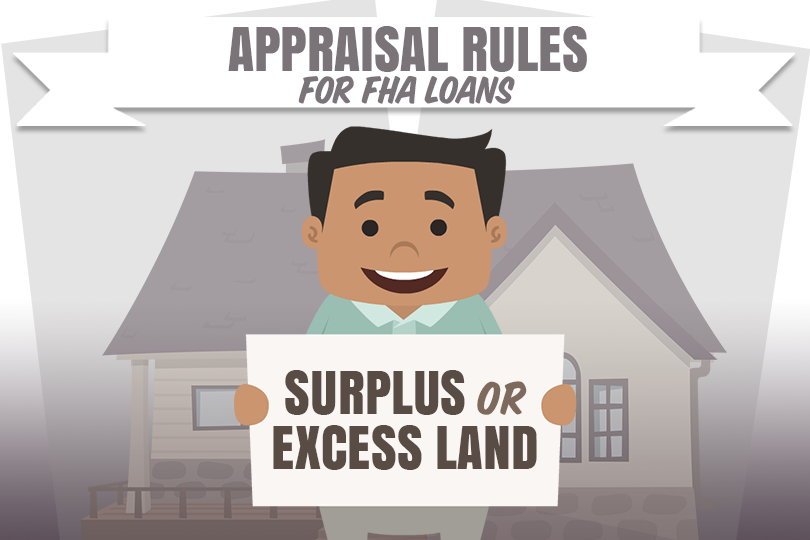FHA Loans, Appraisals, and Excess Land
May 3, 2023
FHA loan rules in HUD 4000.1 discuss appraisal issues related to surplus land or excess land--how does this issue affect the valuation of the home?
The Definition of Surplus or Excess Land
The definition of and rules for surplus/excess land can be found in HUD 4000.1, which says, "Excess Land refers to land that is not needed to serve or support the existing improvement. The highest and best use of the Excess Land may or may not be the same as the highest and best use of the improved parcel. Excess Land may have the potential to be sold separately."
The terms "excess" and "surplus" are NOT interchangeable. Surplus land is described in HUD 4000.1 as, “...land that is not currently needed to support the existing improvement but cannot be separated from the Property and sold off."
Furthermore, surplus Land does not have an independent “highest and best” use. It may or may not “contribute to the value of the improved parcels" according to HUD 4000.1.
FHA Appraisal Guidelines for Surplus/Excess Land
The FHA loan rules for surplus/excess land include a requirement that the FHA appraiser includes the “highest and best” use of the property, “...to support the Appraiser’s conclusion of the existence of Excess Land. The Appraiser must include Surplus Land in the valuation."
FHA loan rules and that in cases where there are “two or more legally conforming platted lots under one legal description and ownership”, and the second vacant lot can be divided /developed “as a separate parcel where such a division will not result in a non-conformity in zoning regulations for the remaining improved lot, the second vacant lot is Excess Land."
The value of the second lot would be excluded from the “final value conclusion of the appraisal”. The appraiser must value the principal site and improvements, “under a hypothetical condition".
There may also be state law and/or lender standards that factor into these procedures. Remember that FHA loan rules are not the only guidelines that will inform the lender’s choices in certain areas. Lender standards and state law will also play an important role.
There are many situations where surplus or excess land might be a factor. If you are not sure how much land is considered “excess” or “surplus”, ask a lender what is typical for the local area and what is considered outside the norm. Your experience may vary; it’s not safe to assume that what is considered “surplus” in one housing market might be considered more typical in another.
------------------------------
RELATED VIDEOS:
What Is an FHA Loan?
Using an FHA Loan Calculator
Meeting FHA Loan Guidelines Improves Your Chances

FHA Loan Articles
November 4, 2023In May 2023, USA Today published some facts and figures about the state of the housing market in America. If you are weighing your options for an FHA mortgage and trying to decide if it’s cheaper to buy or rent, your zip code may have a lot to do with the answers you get.
October 14, 2023FHA loan limits serve as a crucial mechanism to balance financial sustainability, regional variations in housing costs, and the agency's mission to promote homeownership, particularly for those with limited financial resources.
September 25, 2023Mortgage rates are hitting prospective homeowners hard this year and are approaching 8%, a rate that didn't seem very likely last winter. With so many people priced out of the market by the combination of high rates and a dwindling supply of homes.
September 19, 2023The FHA Handbook serves as a crucial resource for mortgage lenders, appraisers, underwriters, and other professionals involved in the origination and servicing of FHA-insured home loans. It outlines the policies and requirements for FHA-insured mortgages.
September 13, 2023FHA rehab loans are a specialized type of mortgage loan offered by the Federal Housing Administration that allows borrowers to finance both the purchase or refinance of a home and the cost of needed repairs.







